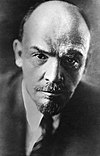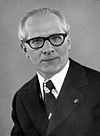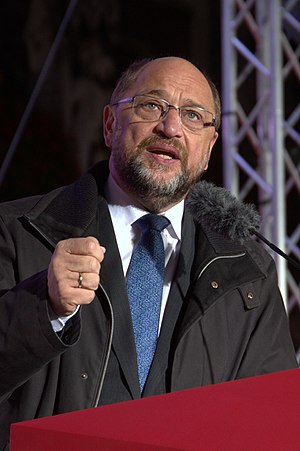First Secretary of Liothidia
Jump to navigation
Jump to search
| First Secretary of the Liothidian Democratic People's Republic | |
|---|---|
| Erster Sekretär der Liothidischen Demokratischen Volksrepublik | |
| File:LPDRemblem.png | |
| Style | Mr. Secretary (formal) Comrade Secretary (domestically His Excellency (in international correspondence) |
| Status | Head of state |
| Seat | Neues Volkspalast, Rahden |
| Nominator | the State Committee for Governance |
| Appointer | the People's and Worker's Assembly |
| Term length | Five years Two |
| Constituting instrument | Constitution of Liothidia |
| Inaugural holder | Heinrich Schrader |
| Formation | 12 August 1918 |
| Deputy | Vice Secretary |
| Website | First Secretary |
List
| Portrait | Name (Lifespan) |
Term of office | Vice Secretary | |||
|---|---|---|---|---|---|---|
| 1 | 
|
Heinrich Schrader (1869–1923) |
12 August 1918 | 11 November 1923 | Reinhardt Kessler | |
| Schrader led the WSP to power during the August Revolution and was the key architect of the "Ultra One-Party-State" (Ultra-Einparteienstaat). He is considered one of the Great Commissars (Große Kommissare) of the LDPR. | ||||||
| 2 | 
|
Reinhardt Kessler (1870–1955) |
11 November 1923 | 12 August 1946 | Wilhelm Dittmar Viktor Heider | |
| Kessler led the People's Revolutionary Tribunal during the Überholung, he was Schrader's designated successor following his illness in 1920. Kessler focused on expanding the economy and reconstructing society toward socialism. Kessler retired in 1930 over his seeking of relations with monarchies across Belisaria, he was succeeded by his Vice Secretary and militant revolutionary, Viktor Heider. Kessler, alongside Schrader and Heider is considered an Große Kommissar. His final two years in office saw the outbreak of the Second Lio-Vannoisian War. | ||||||
| 3 | 
|
Gabriel Landauer (1896–1971) |
12 August 1946 | 4 September 1959 | Friedrich Ulbricht | |
| Landauer succeeded Kessler during the Second Lio-Vannoisian War and established a War Committee to lead the nation, his efforts at transitioning Liothidia into a total war setting enabled the military to make significant gains and during the stalemate of 1947-1949, hold its positions while inflicting serious losses on the allied forces. During his time in office, the Liothidian military developed the first ever atomic weapon and utilised it on the Vannoisian city of XX on November 3 1949, however, on April 4 1950, the allied forces retaliated with the dropping of an atomic bomb on the city of Demsten, pushing both sides to a negotiated peace in 1951. Landauer oversaw reconstruction and the de-mobilisation of the military, while outreaching to Liothidia's former allies to secure the peace of 1951. His time in office as a war leader secured him the status of a Große Kommissar. | ||||||
| 4 | 
|
Dieter Vetter (1895–1977) |
4 September 1959 | 12 August 1970 | Egon Krauss Armin Stahl | |
| Vetter emerged as a hardliner on reform, halting the economic and political reforms introduced by Landauer. He dramatically expanded the powers of the People's Commissariat for Internal Security, introducing the vast informant system. From 1965 until 1970, Vetter oversaw the resumed assassination program against Liothidian exiles. | ||||||
| 5 | 
|
Armin Stahl (1913–1991) |
12 August 1970 | 3 December 1990 | Wernrer Hoelscher Margarete Radner | |
| Stahl previously served as Vetter's Vice Secretary before succeeding as First Secretary. Stahl was a vocal critic of his hardline position and immediately set about restarting the reform process. His reform programme was dubbed Popular Socialism and was a radical agenda, including the introduction of a highly control and vetted democratic system of allowing independents run against party-candidates in elections, while private property, profit-based economics would be permitted with state oversight and control in key sectors. His reforms would not be completed until 1989 and eventually led to dramatic economic modernisation and growth, while simultaneously he enhanced the capabilities of the secret police and the military. His government also oversaw a dramatic increase in Liothidian assistance for socialist regimes, including Nahlia, Marad and Estoni. | ||||||
| 6 | 
|
Manfred von Weizsäcker (1926–2002) |
3 December 1990 | 12 August 1995 | Marcus Kasner | |
| Von Weizsäcker had served as Stahl's long-serving Finance Minister and a key ally in his Popular Socialism agenda. Von Weizsäcker's term was inherently focused solely on defending Popular Socialism from hardliners who saw it as an abandonment of Socialism and Democratic Centralism. However, he did succeed in improving relations with the growing Belisarian Community and increasing the country's trade relations. | ||||||
| 7 | 
|
Marcus Kasner (1944–) |
12 August 1995 | 12 August 2005 | Reinhardt Waldstein | |
| Kasner succeeded Von Weizsäcker on a wave of popular support for the reform agenda, however in 1997, mass student protests erupted when the political reform agenda was declared complete. Students found the provisions to be inherently controlling and uninspiring. The 1997-1998 Liothidian Student Protests were met by a government crackdown, the crisis left over 300 people dead and another 1,100 missing or disappeared. In response, Kasner and the ruling Worker's Socialist Party sought to re-affirm popular support for socialism, through what many consider to be a progenitor left-wing populism seen in the current era. Kasner's administration also increased efforts at modernisation and professionalisation of the People's Revolutionary Army and intelligence services. | ||||||
| 8 | 
|
Tadeusz Kurzawa (1955–) |
12 August 2005 | 12 August 2015 | Georg von Carstein | |
| Kurzawa succeeded Kasner as a unity candidate between reformists and hardliners. However, Kurzawa soon repealed parts of the political reform, enhancing party control over the independents freely elected, while censorship, cyber-intelligence and secret police powers were expanded dramatically, while he also instigated reforms to education and healthcare, improving the quality and inclusiveness. Over 300 new hospitals were constructed and despite major opposition, reintroduced a private-healthcare provision that would enable patients to use their own finances to jump waiting ques and seek operations. To combat inequality, Kurzawa's administration reintroduced mandatory organ and blood donations from prisoners. | ||||||
| 9 | 
|
Georg von Carstein (1955–) |
12 August 2015 | Current incumbent | Friedrich Hoffmann | |
| Current incumbent, Von Carstein has focused government efforts on combating the gap between rich and poor and the stagnating population growth. His government has also sought to capitalise on Liothidia's enhanced economic power to confirm it as a "Major Power of the 21st Century." His government following the previous, has increased and modernised state repression and limited the growth political Popular Socialism. | ||||||
